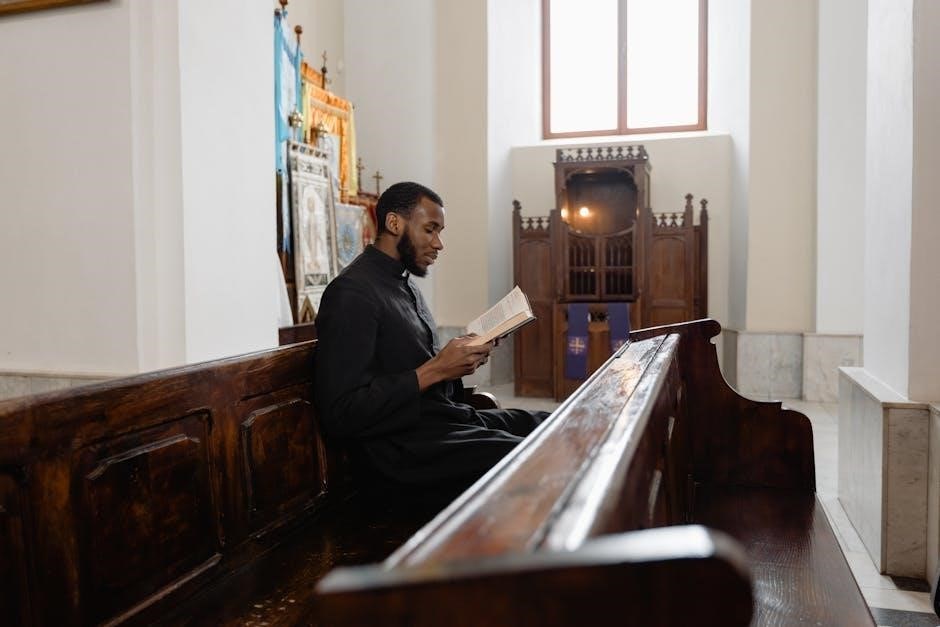The Black presence in the Bible is a vital yet often overlooked aspect of biblical narratives, empowering Black identity and challenging Eurocentric misinterpretations of Scripture․
Overview of the Significance of Black Identity in Biblical Narratives
The significance of Black identity in biblical narratives is profound, as it highlights the integral role of African descendants in shaping sacred history․ Figures like Cush, Nimrod, and the Queen of Sheba demonstrate Black contributions to civilization and spirituality․ These accounts refute the misinterpretation of the Curse of Ham, which was wrongly used to justify oppression․ Instead, Scripture affirms the dignity and worth of all people, emphasizing God’s inclusive plan for humanity․ By exploring these narratives, modern readers gain a richer understanding of diversity in biblical times and the unity of all nations under God’s sovereignty․ This perspective challenges Eurocentric views and restores the accurate historical and theological context of Black presence in the Bible․
The Importance of Exploring Black Presence for Modern Readers
Exploring the Black presence in the Bible is crucial for modern readers as it empowers individuals to reclaim their heritage and challenge Eurocentric misinterpretations of Scripture․ By uncovering the contributions of African descendants, readers gain a deeper understanding of their identity and spiritual roots․ This exploration also fosters reconciliation and unity by highlighting the Bible’s inclusive message․ It addresses historical inaccuracies and restores the dignity of Black people in biblical narratives; Understanding this presence enriches one’s faith and promotes a more accurate representation of diversity in Scripture․ Ultimately, it serves as a powerful tool for empowerment, education, and spiritual growth in today’s diverse world․

Historical Context of Black People in the Bible
The Bible traces Black presence through genealogies like Ham, Shem, and Japheth, highlighting Cush and Mizraim’s roles, while addressing the misinterpretation of the Curse of Ham․
The Biblical Genealogy of Ham, Shem, and Japheth
The biblical genealogy of Ham, Shem, and Japheth, Noah’s sons, is foundational to understanding the Black presence in Scripture․ Ham, meaning “black” or “dark,” is highlighted as the father of Cush, Mizraim, Phut, and Canaan; Cush’s son Nimrod is noted as one of the first great leaders in biblical history․ Shem, meaning “dusty” or “name,” and Japheth, meaning “light,” complete the trio․ This genealogy is crucial for tracing the origins of nations and peoples, including those of African descent․ The Bible emphasizes the significance of these lineages in God’s plan, refuting any notion of racial hierarchy and affirming the dignity of all peoples․ This framework is essential for exploring the Black presence in biblical narratives and theology․
The Role of Cush and Mizraim in Biblical History
Cush and Mizraim, sons of Ham, played pivotal roles in biblical history, contributing significantly to the cultural and spiritual landscape․ Cush is noted as the father of Nimrod, a mighty leader who established Babylon and Assyria, while Mizraim is associated with the origins of Egypt․ These nations were integral to the biblical narrative, influencing trade, civilization, and religious practices․ The Bible highlights their prominence, with Cush symbolizing strength and Mizraim embodying the richness of Egypt․ Their roles underscore the importance of African descendants in shaping biblical events and emphasize the unity of all nations under God’s plan․ This historical context is vital for understanding the Black presence in Scripture and its theological implications․
The Curse of Ham and Its Misinterpretation
The curse of Ham, often misinterpreted, has been used to justify racism and oppression․ Biblically, Ham, one of Noah’s sons, saw his father naked, leading to a curse on his son Canaan․ However, this curse was wrongly applied to all Black people, perpetuating harmful stereotypes․ The Bible does not support racial superiority or inferiority, as all nations are part of God’s plan․ This misinterpretation has been used to marginalize Black people, contradicting the Bible’s message of unity and equality․ Understanding this misinterpretation is crucial for refuting false doctrines and embracing the inclusive nature of Scripture, which values all people regardless of ethnicity or skin color․

Key Black Figures in the Bible
Figures like Cush, Nimrod, the Queen of Sheba, Moses, and the Ethiopian Eunuch highlight the significant roles Black individuals played in shaping biblical narratives and theology․
The Life and Legacy of Cush and His Descendants
Cush, a son of Ham, holds a significant place in biblical genealogy as the ancestor of powerful nations and influential figures․ His descendants, including Nimrod, became prominent leaders, with Nimrod noted as a mighty hunter and founder of Babylon․ The Cushites, associated with the region of Ethiopia, played crucial roles in biblical history, often symbolizing strength and wisdom․ Cush’s legacy extends through his offspring, who contributed to the cultural and spiritual tapestry of the ancient world․ Recognizing Cush’s importance challenges Eurocentric interpretations and highlights the rich diversity of biblical narratives, emphasizing the integral role of Black individuals in God’s plan․ This heritage remains vital for understanding the inclusive nature of Scripture․
Nimrod: The First Great Leader in Scripture
Nimrod, a son of Cush, is recognized as the first great leader in Scripture, noted for his strength and ambition․ As a mighty hunter, he established Babylon and other cities, showcasing his influence․ His legacy highlights the significance of Black leadership in early biblical history․ Nimrod’s story challenges Eurocentric interpretations, affirming the African heritage of key biblical figures․ His achievements underscore the diversity and richness of God’s plan, emphasizing the integral role of Black individuals in shaping human civilization․ Nimrod’s impact remains a testament to the profound contributions of African descendants in the Bible, offering a powerful narrative of leadership and cultural influence․ His story is a cornerstone in understanding the Black presence in Scripture․
The Queen of Sheba: A Symbol of Wisdom and Power
The Queen of Sheba, a powerful African ruler, is celebrated in Scripture for her wisdom, wealth, and diplomatic prowess․ Her visit to King Solomon highlights her intellectual curiosity and leadership, as she sought wisdom and formed alliances․ As a Black woman in a position of authority, she embodies the strength and dignity of African leadership․ Her story challenges Eurocentric narratives, affirming the presence and influence of Black individuals in biblical history․ The Queen of Sheba’s legacy serves as a testament to the diversity of God’s plan, showcasing the unity and interconnectedness of nations․ Her journey remains a powerful symbol of wisdom, cultural exchange, and the empowerment of Black identity in Scripture․
Moses and His African Connections
Moses, a central figure in the Bible, has significant African connections that highlight the Black presence in Scripture․ Raised in Egypt, Moses was deeply influenced by African culture and wisdom․ His marriage to an Ethiopian woman, a descendant of Cush, further solidifies his African ties․ The Israelites’ sojourn in Africa and their interactions with African nations underscore the biblical narrative’s African context․ Moses’ leadership and prophetic role emphasize the importance of African heritage in God’s plan․ These connections challenge Eurocentric interpretations and affirm the diversity of biblical history, showcasing the integral role of Black individuals and nations in shaping Israel’s story and spiritual identity․ Moses’ African connections are a testament to the rich cultural tapestry of the Bible․
The Ethiopian Eunuch: A Key Figure in the New Testament
The Ethiopian Eunuch, a high-ranking official in the court of Queen Candace, is a pivotal figure in the New Testament, symbolizing the inclusion of Africans in God’s plan․ His encounter with Philip in Acts 8:26-40 marks a significant moment in early Christianity, as he becomes the first African convert․ The Eunuch’s connection to the African continent and his role in spreading the Gospel highlight the Bible’s emphasis on diversity and inclusivity․ His story challenges Eurocentric interpretations and affirms the importance of Black presence in biblical narratives․ The Eunuch’s baptism and subsequent ministry demonstrate God’s universal love and the unity of all nations in His plan, making him a powerful symbol of faith and reconciliation․ His legacy continues to inspire and empower Black identity today․

Black Presence in the Old Testament
The Old Testament highlights the significant roles of Cush, Mizraim, and other African nations, showcasing their influence and connections to Israel’s history and divine plan․
The Israelites’ Connection to Africa
The Israelites’ connection to Africa is deeply rooted in biblical history, particularly through their 400-year sojourn in Egypt․ This period, marked by both oppression and divine deliverance, shaped their identity and faith․ Moses, a key leader, had significant African connections, including his upbringing in an Egyptian palace and his marriage to a Cushite woman․ Additionally, the Queen of Sheba, a symbol of African wisdom and power, interacted with King Solomon, highlighting Africa’s influence on Israel’s spiritual and cultural landscape․ These narratives underscore Africa’s integral role in biblical history and God’s inclusive plan for all nations, emphasizing unity and diversity in His divine design․
The Role of Black Nations in Prophetic Narratives
Black nations, such as Cush and Egypt, play significant roles in biblical prophetic narratives, often symbolizing divine judgment and restoration․ Cush, a descendant of Ham, is depicted as a powerful and influential nation, while Egypt’s role in Israel’s history highlights its prophetic importance․ The misinterpretation of the “Curse of Ham” has historically been used to marginalize Black people, but biblical texts emphasize God’s inclusive plan for all nations․ Prophets like Isaiah and Jeremiah often referenced these nations to illustrate God’s sovereignty and redemption; Understanding their roles challenges Eurocentric interpretations and reaffirms the Bible’s message of unity and diversity, showcasing Black nations as integral to God’s prophetic plan․
The Significance of Egypt in Biblical History
Egypt holds a central place in biblical history, particularly in the narrative of the Israelites․ The sojourn of the Israelites in Egypt, their oppression, and the miraculous Exodus are pivotal events․ Egypt symbolizes both divine judgment and restoration, as seen in the plagues and the parting of the Red Sea․ Archaeological and historical records confirm that ancient Egyptians were Black, challenging Eurocentric interpretations of Scripture․ Egypt’s role in prophetic narratives, such as Isaiah’s prophecies, underscores its significance in God’s plan․ The Bible’s portrayal of Egypt highlights its cultural and spiritual impact, emphasizing God’s sovereignty and the unity of all nations under His divine plan․ This challenges misconceptions and reaffirms the inclusive nature of biblical history․

Black Presence in the New Testament

The New Testament highlights key figures like the Ethiopian Eunuch, Simon of Cyrene, and Apollos, showcasing the significant roles of Black individuals in early Christianity․
The Ministry of Simon of Cyrene
Simon of Cyrene, a Black man from Africa, is famously known for carrying Jesus’ cross during the crucifixion journey․ His conscription by Roman soldiers highlights the intersection of race, power, and faith․ This pivotal moment in the New Testament underscores the active participation of Black individuals in key biblical events․ Simon’s role not only reflects the diversity of early Christianity but also symbolizes the universal call to bear the burdens of others․ His story challenges Eurocentric interpretations of Scripture and reaffirms the integral role of Black people in the biblical narrative, offering a powerful symbol of service, humility, and redemption for modern readers․
The Ethiopian Eunuch’s Encounter with Philip
The Ethiopian eunuch, a high-ranking African official, encountered Philip in Acts 8:26-40, marking a pivotal moment in the New Testament․ This encounter symbolizes the inclusion of Black individuals in early Christianity and highlights the universality of the Gospel․ The eunuch, returning from Jerusalem, was reading Isaiah and sought understanding, which Philip provided, leading to his baptism․ This event underscores the active role of Africans in the early church and challenges Eurocentric narratives․ It also emphasizes the Bible’s message of inclusivity, as Philip, a Jewish follower of Jesus, ministers to a Black African leader․ This story remains a powerful testament to the diversity and unity of God’s plan, resonating deeply with modern readers seeking to understand Black presence in Scripture․
The Role of Apollos in Early Christianity

Apollos, an African Christian leader from Egypt, played a significant role in early Christianity, as noted in Acts 18:24-28 and 1 Corinthians 1:12․ A skilled orator and theologian, he effectively preached the Gospel, strengthening the church in Corinth and Ephesus․ His ministry complemented that of Paul and Aquila, demonstrating collaboration across cultural and ethnic lines․ Apollos’s contributions highlight the active participation of African believers in the early church, challenging Eurocentric narratives that often overlook Black presence․ His story underscores the Bible’s emphasis on unity and diversity, showing how individuals from various backgrounds contributed to the spread of Christianity․ This reflects the inclusive nature of God’s plan, as documented in Scripture․

Theological Implications of Black Presence
The Bible affirms the dignity and worth of all people, emphasizing unity and inclusivity․ Black presence in Scripture underscores God’s plan for all nations, countering divisive interpretations․

Refuting the Curse of Ham: A Biblical Perspective
The so-called “Curse of Ham” has been misinterpreted to justify racism and oppression, but the Bible does not support this view․ Genesis 9:20-27 describes Noah’s curse on Canaan, not Ham himself, and it was not related to skin color․ This misinterpretation has been used to marginalize Black people, but it contradicts the Bible’s message of unity and equality․ The Scriptures emphasize that all nations are part of God’s plan, and there is no biblical basis for racial superiority․ By refuting this false doctrine, we align with the Bible’s teachings on human dignity and the unity of all people under God․
The Unity of All Nations in God’s Plan
The Bible underscores the unity of all nations in God’s plan, emphasizing that humanity shares a common origin and destiny․ Galatians 3:28 declares that in Christ, there is no distinction between ethnicities, as all are one․ This unity is reflected in the diverse peoples and nations mentioned throughout Scripture, including those of African descent․ The biblical narrative highlights God’s love for all nations, as seen in the Great Commission (Matthew 28:19) and the vision of Revelation 7:9, where people from every nation worship together․ This theological foundation challenges divisions and promotes reconciliation, affirming that diversity is part of God’s design․ The unity of all nations in God’s plan is a central theme that transcends cultural and racial boundaries․
The Bible’s Message of Inclusivity and Diversity
The Bible’s message of inclusivity and diversity is evident throughout its narratives, emphasizing God’s love for all nations and ethnicities․ From the genealogy of Ham, Shem, and Japheth to the stories of Cush, Mizraim, and the Queen of Sheba, Scripture highlights the presence and significance of Black individuals and nations․ The Ethiopian eunuch’s encounter with Philip (Acts 8:26-40) and the inclusion of African leaders in early Christianity demonstrate God’s plan for a diverse and unified body of believers․ This theological foundation challenges Eurocentric interpretations and affirms the value of all people, reflecting God’s intention for humanity to live in harmony and mutual respect․ The Bible’s message of inclusivity and diversity remains a powerful testament to God’s universal love and plan for all nations․
Modern Relevance of Black Presence in the Bible
Recognizing the Black presence in the Bible empowers identity, challenges Eurocentric narratives, and fosters reconciliation, highlighting God’s inclusive plan for all nations and ethnicities today․
Empowering Black Identity Through Biblical Heritage

Exploring the Black presence in the Bible empowers individuals by revealing a rich, divine heritage often obscured by Eurocentric interpretations․ Biblical figures like Cush and Nimrod highlight Black leadership and contributions, showcasing God’s inclusive plan․ This knowledge counters historical misrepresentations, fostering pride and spiritual identity․ By reclaiming this heritage, Black communities can affirm their value and dignity, aligning with Scripture’s affirmation of all nations․ This empowerment not only enriches personal faith but also promotes unity, reflecting God’s love for diversity․ Understanding this legacy challenges misconceptions and strengthens cultural and spiritual roots, emphasizing the unity of all people in God’s plan․
Addressing Eurocentric Misinterpretations of Scripture
Eurocentric interpretations have often distorted biblical narratives, marginalizing Black presence and misrepresenting Scripture․ The misinterpretation of the Curse of Ham is a prime example, falsely justifying discrimination․ Correcting these distortions reveals the Bible’s inclusive message, affirming the dignity of all people․ By examining the roles of Black figures like Cush and Nimrod, we uncover their significant contributions to biblical history․ This correction fosters unity and challenges racial biases, aligning with God’s plan for all nations․ Understanding the true biblical account promotes reconciliation and reflects the divine love for diversity, countering harmful stereotypes and empowering communities to embrace their heritage․ This shift in perspective is essential for a more accurate and inclusive understanding of Scripture․
The Role of Black Presence in Reconciliation and Unity
The Black presence in the Bible serves as a powerful tool for reconciliation and unity, challenging racial biases and fostering mutual respect․ By recognizing the significant roles of Black figures like Moses, the Ethiopian Eunuch, and others, we affirm the diversity of God’s plan․ This acknowledgment dismantles divisions and promotes inclusivity, reflecting the Bible’s message of unity among all nations․ Churches and communities can use this understanding to bridge gaps, celebrate shared heritage, and embody Christ’s prayer for oneness․ Accurate biblical imagery and reflections during Black History Month further enhance this reconciliatory journey, fostering a deeper appreciation for the richness of Black contributions to faith and history․
Practical Applications for Churches and Communities
Churches can incorporate Black biblical history into worship, use accurate imagery, and observe Black History Month with reflections, fostering unity and empowering diverse congregations through education․
Incorporating Black Biblical History in Worship and Teaching
Incorporating Black biblical history into worship and teaching enriches congregational understanding and fosters inclusivity․ Churches can integrate stories of key Black figures, such as Cush, Nimrod, and the Ethiopian Eunuch, into sermons and Bible studies․ Using resources like The Black Presence in the Bible by Walter Arthur McCray provides a foundational guide for exploring these narratives․ Additionally, emphasizing the role of African nations in biblical prophecy and the Israelites’ connection to Egypt can deepen spiritual connections․ By accurately representing Black presence, churches can empower diverse congregations and counteract Eurocentric interpretations, promoting a more unified and culturally aware faith community․
Using Accurate Biblical Imagery in Art and Literature
Accurate biblical imagery in art and literature is crucial for reflecting the diversity of Scripture․ Depicting figures like the Ethiopian Eunuch, Cush, and African nations truthfully honors their biblical roles․ Artists and authors should avoid Eurocentric portrayals, instead emphasizing the African heritage of many biblical characters․ This ensures authenticity and challenges stereotypes․ Resources like The Black Presence in the Bible provide historical context for accurate representations․ By doing so, art and literature can inspire a deeper appreciation for the global nature of God’s plan․ This approach fosters inclusivity and enriches the cultural tapestry of biblical storytelling, ensuring all people see themselves reflected in Scripture․
Observing Black History Month with Biblical Reflections
Observing Black History Month with biblical reflections offers a profound way to honor the rich contributions of Black individuals in Scripture․ Churches and communities can highlight key figures like Cush, Nimrod, and the Queen of Sheba, exploring their roles in biblical narratives․ This provides an opportunity to challenge Eurocentric interpretations and reclaim the African heritage embedded in the Bible․ By incorporating sermons, studies, and discussions focused on Black biblical history, congregations can foster a deeper understanding of God’s inclusive plan․ Accurate imagery and storytelling can also be used to celebrate these figures, empowering Black identity and promoting unity․ This observance not only educates but also inspires reconciliation and appreciation for the diversity reflected in Scripture․
The Black presence in the Bible is a testament to God’s inclusive plan, empowering Black identity and correcting historical misinterpretations, ensuring its ongoing relevance today․
Summarizing the Significance of Black Presence in the Bible
The Black presence in the Bible is profound, with individuals like Cush, Nimrod, the Queen of Sheba, Moses, and the Ethiopian Eunuch showcasing Black influence and leadership․ These figures, deeply rooted in biblical narratives, highlight the integral role of Black people in God’s plan․ The misinterpretation of the Curse of Ham has historically been used to marginalize, but Scripture affirms the dignity and worth of all nations․ The Bible’s inclusive message emphasizes unity and diversity, countering Eurocentric distortions․ By exploring Black biblical heritage, modern readers gain a richer understanding of God’s love for all people, fostering reconciliation and empowerment․ This legacy remains vital today, enriching faith and identity for believers worldwide․
The Ongoing Impact of Black Biblical Heritage Today
The Black presence in the Bible continues to inspire and empower modern communities, fostering pride in African heritage and challenging Eurocentric misinterpretations․ By reclaiming their biblical roots, Black individuals and churches affirm their identity and contributions to God’s plan․ This heritage promotes unity, as it highlights the Bible’s message of inclusivity and diversity․ Educating congregations about Black biblical figures and nations enriches worship and teaching, encouraging accurate representations in art and literature․ Observing Black History Month with biblical reflections further bridges cultural and spiritual gaps․ Ultimately, this awareness fosters reconciliation and strengthens faith, ensuring the ongoing legacy of Black biblical heritage remains a powerful force for empowerment and unity today․
